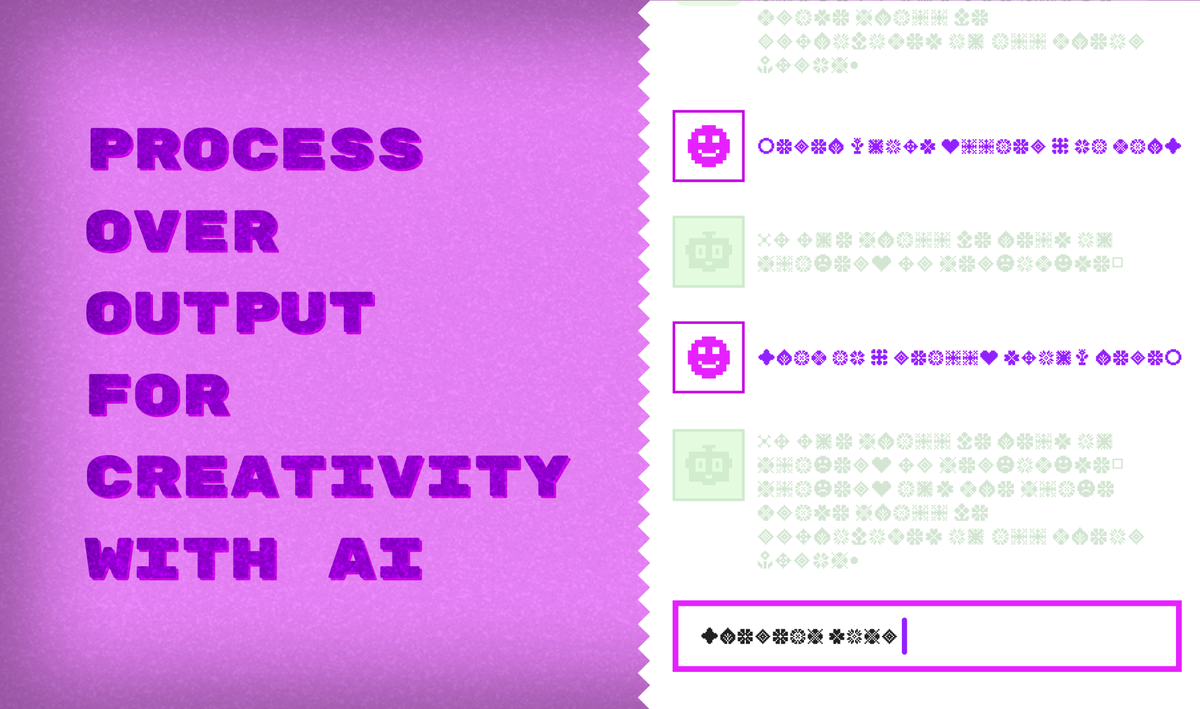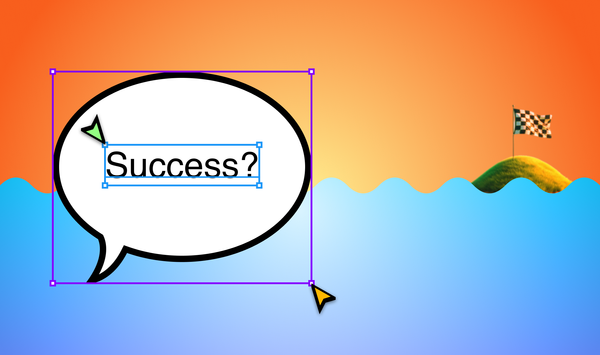Focus on how you work with AI, not what it answers
Forget the shortcuts and prompting tips and attain real creative satisfaction by focusing on the process

90% of the value I derive from ChatGPT comes from thinking about my prompt. In forcing myself to think out loud and give instructions to a responsive system, it gives me clarity. The response from ChatGPT almost becomes irrelevant.
This doesn't work as effectively if I were to write into an empty notepad. That's because the mere illusion of intelligence on the other end makes me more compelled to write something clear. Knowing that hitting Send will actually give me an answer compels me to think more deeply because I want the recipient to understand. The quality of the AI’s first response doesn't matter as long as I believe that I can improve the following responses by speaking even more clearly.
Humans crave responsiveness and understanding. By cooperating when I think, I am hijacking my brain’s innate desire to get a response and feel understood. This may work particularly well for me because I naturally think better out loud. Many times, I will come to someone with a problem and as I am describing it, I will get an answer myself. The recipient’s answer was not what I derived most value from, it was the act of explaining my thoughts.
For those that have used ChatGPT, the experiences below may sound familiar:
- You start typing in a prompt, but you stop when you realize you’re having a hard time wording it “correctly”.
- You get a response from ChatGPT but the quality is so poor, you’re not sure if your request was insufficient or the AI is completely confused.
- You’ve typed in several prompts in response to ChatGPT’s answers and realize that you may as well have done the task yourself at this point.
Each of these points is a symptom of different phases in your thought processes. Consider them from your perspective instead:
- Your prompt expertise isn’t the issue. You’re likely not yet clear on what exactly you’re even thinking about.
- AI hallucinations aside, your thinking is likely still unclear enough that you’re not able to judge what qualifies as a good answer.
- After several rounds of prompting, your thinking has clarified and the staggering incompetence of ChatGPT finally becomes apparent.
In fact, the prompt itself is rarely the problem. You can know this to be 100% true because if you copy/paste a prompt into ChatGPT on a few different days, you’ll get different answers. The machine is inconsistent, and you shouldn’t take its answers seriously. But that process of refining your thoughts is absolutely a super power. The AI is tireless and will indulge my bad and unclear ideas without ever getting bored or frustrated.
Using GenAI to think rather than do
You can leverage this fully to improve your thinking. I have outlined three main processes and mental models which I try to practice.
Internalize that the act of “prompting” is most important
First and most critically, internalize the truth that the act of prompting is the most valuable part of the interaction. The value is not in perfecting prompts or finding hacks that produce high quality answer. In exercising your brain to generate demands that accurately communicate your needs with clarity and specificity, you’re essentially improving your ability to think clearly.
Another benefit comes from the phenomenon that we are better at reacting than creating from scratch. Since a paper or note-taking app doesn’t respond, we have to exert a lot of energy to get our minds moving. In writing this inertia is called blank page syndrome, but really it happens for any kind of problem solving. By getting an answer, even one you’re not happy with, you immediately start trying again. This forces you to refine your thinking while simultaneously overcoming the inertia of starting from nothing.
Resist the urge to be impressed when evaluating an answer
Computers have been completely inept at generating human readable text for the entirety of their existence. This makes it easy to feel blown away by what you see with generative AI right now. That novelty combined with our bias towards trusting machines to produce more reliable products primes us to perceive GPT-generated text as being better than we think. (In fact there are likely several cognitive biases related to this. I’m currently writing an article about it, so subscribe if you’d like to get it when it comes out.)
The good thing is that we have another mental mechanism that can override this initial perception. Revising something with a fresh perspective has long been the best path to bettering a products quality, and a good night’s sleep does wonders for freshness. When I reread a text generated by ChatGPT the next day, I often feel deceived. How could my yesterday-self possibly have approved of this?
Over time, I am training myself to reduce my enthusiasm after the first take. When I see an answer from ChatGPT, I now ask myself:
- How clear would this be to someone who reads it without access to my prompt?
- How many ways can my prompt be interpreted if I sent it to several different people?
- How aggressively am I desperate to rid myself of this task, such that I so readily take whatever will rid me of it?
Explicitly use AI to clarify your thinking
In the other two sections, I mentioned indirect benefits to your thinking by using generative AI. There is a way to use it more directly, and that is to simply to engage it in the task of prompting and thinking directly.
Rather than entering prompts that request answers from ChatGPT, try requesting questions. For example, ask it things like:
What questions would you have about this prompt: [Insert prompt]
The responses always surprises me. The sheer number of questions that can arise from what I thought was a clear request makes me realize how much more depth I could have applied to the question in my head. It acts like a flashlight that reveals all the [[dusty corners]] of the idea I thought I had vacuumed so well.
Try asking for guidance in your thinking rather than prompting. For example:
I am trying to understand [difficult concept]. What questions would help me get started with the topic?
Or ask for perspectives:
I’ve been generating ideas for [topic] and the best approach is [solution]. What are some questions that I may have left unconsidered?
In all of these, I am asking for questions rather than statements. The goal is both to get clarity in my thinking, and develop the instinct of iterating on a thought without assistance. Questions train your brain to think more carefully whereas answers get it addicted to a lack of effort.
Conclusion
Our collective obsession with these machines increasing the quantity of what we can do is distracting from the potential that they can improve the quality of our approach. The problem is that the latter requires more work, but that should be a good thing. The most powerful thing generative AI did for overcoming creative block is give us a simple collaborative partner that never gets bored, not a super-powered intern that can generate hundreds of disposable ideas.
I am far more interested in seeing a future of creative work that enables people because they feel more confident and stimulated. Not one where we simply perfected cookie-cutter prompts that lead to derivative machine-generated outputs.





